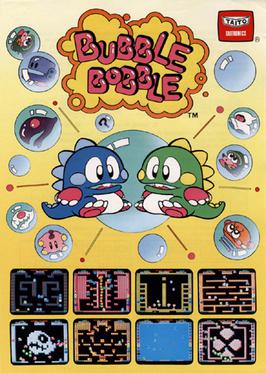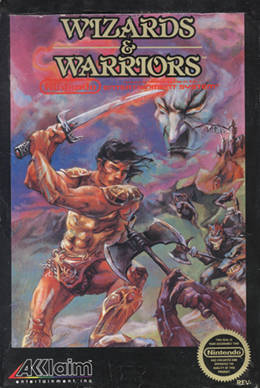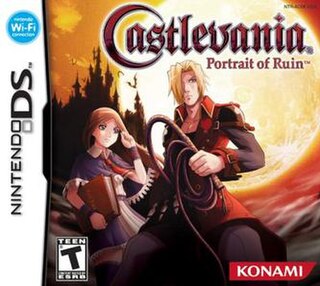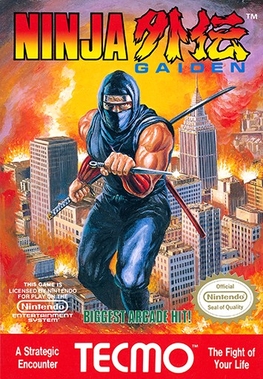
Bubble Bobble is a 1986 platform game developed and published by Taito for arcades. It was distributed in the United States by Romstar, and in Europe by Electrocoin. Players control Bub and Bob, two dragons that set out to save their girlfriends from a world known as the Cave of Monsters. In each level, Bub and Bob must defeat each enemy present by trapping them in bubbles and popping, who turn into bonus items when they hit the ground. There are 100 levels total, each becoming progressively more difficult.

Faxanadu is an action role-playing platform video game developed by Hudson Soft for the Nintendo Entertainment System. The name was licensed by computer game developer Nihon Falcom ("Falcom") and was developed and released in Japan by Hudson Soft for the Famicom in 1987. Nintendo released the game in the United States and Europe as a first-party title under license from Hudson Soft.

Zelda II: The Adventure of Link is an action role-playing game developed and published by Nintendo. It is the second installment in the Legend of Zelda series and was released in Japan for the Famicom Disk System on January 14, 1987—less than one year after the Japanese release and seven months before the North American release of the original The Legend of Zelda. Zelda II was released in North America and the PAL region for the Nintendo Entertainment System in late 1988, almost two years after its initial release in Japan.
Ninja Gaiden is a media franchise based on action video games by Tecmo featuring the ninja Ryu Hayabusa as its protagonist. The series was originally known as Ninja Ryukenden in Japan. The word "gaiden" in the North American Ninja Gaiden title means "side story" in Japanese. The original arcade version, first two Nintendo Entertainment System games and Game Boy game were released as Shadow Warriors in PAL regions. As of 2008, the series has shipped over 7.7 million copies.

Castlevania II: Simon's Quest is a 1987 action role-playing game developed and published by Konami. It was originally released in Japan in 1987 for the Famicom Disk System, and in North America in 1988 for the Nintendo Entertainment System. It is the second Castlevania game released for the NES, following the original Castlevania (1986). Set seven years after the events of the first installment, the player once again assumes the role of vampire hunter Simon Belmont, who is on a journey to undo a curse placed on him by Dracula at the end of their previous encounter. Dracula's body was split into five parts, which Simon must find and bring to the ruins of Castle Dracula in order to defeat him. The game deviates from the traditional platforming of its predecessor, incorporating role-playing and open world elements.

ActRaiser 2 is a side-scrolling platform game for the Super Nintendo Entertainment System developed by Quintet and published by Enix in 1993.

Nekketsu Kōha Kunio-kun, released as Renegade in the West, is a beat 'em up video game developed by Technōs Japan and distributed by Taito for the arcades in 1986. In the original Japanese version Nekketsu Kōha Kunio-kun, the game revolves around a high-school delinquent named Kunio-kun who must stand up against a series of rival gangs frequently targeting his classmate Hiroshi. In the Western version Renegade, the player controls a street brawler who must face four different gangs in order to rescue his girlfriend being held captive by a mob boss.

Castlevania III: Dracula's Curse is a 1989 action-platform game developed and published by Konami for the Nintendo Entertainment System. It was released in Japan in 1989, and in North America in 1990, and in Europe by Palcom in 1992. It was later released on the Virtual Console for the Wii, Nintendo 3DS, and Wii U.

Castlevania, also referred to as Castlevania 64, is a 1999 action-adventure game developed by Konami's Kobe branch for the Nintendo 64. An expanded version of the game, Castlevania: Legacy of Darkness, was released later in the same year.

Castlevania: Legacy of Darkness is a 1999 action-adventure game developed and published by Konami for the Nintendo 64. A prequel and expanded version of Castlevania, also released on the Nintendo 64 earlier the same year, it contains a remake of the original game with improved graphics, added villains, and alternate versions of some levels.

Super Castlevania IV is a 1991 action-platform game developed and published by Konami for the Super Nintendo Entertainment System. It has been re-released multiple times, including for the Super NES Classic Edition.

Castlevania: Dracula X, titled Castlevania: Vampire's Kiss in Europe and Akumajou Dracula XX in Japan, is a 1995 action-platform game developed and published by Konami for the Super Nintendo Entertainment System. It is the second Castlevania installment to be released for the Super NES. It is a remake of Castlevania: Rondo of Blood, which was previously released in Japan on the PC Engine Super CD-ROM2 in 1993. While the plot is similar to Rondo of Blood and it uses many of that game's graphics, it features new levels and altered gameplay elements, rather than being a direct port because of the limits of the Super NES cartridge format and exclusivity agreements with PC Engine maker NEC. It was released on July 21, 1995 in Japan, in September 1995 in North America, February 22, 1996 in Europe, and on June 22, 1996, in Australia. The game received mixed reviews, with journalists considering it inferior to Rondo of Blood and criticizing its high difficulty.

Wizards & Warriors, titled Densetsu no Kishi Elrond in Japan, is an action platform video game developed by Rare and published by Acclaim Entertainment for the Nintendo Entertainment System. It was released in North America in December 1987, and in Europe on January 7, 1990. The player controls Kuros, "Knight Warrior of the Books of Excalibur", as he sets out in the Kingdom of Elrond to defeat the evil wizard Malkil. Malkil holds the princess of Elrond captive in Castle IronSpire, deep within the forests of Elrond. The player fights through forests, tunnels, and caves, while collecting keys, treasure, weapons, and magic items.

Mega Man: Dr. Wily's Revenge, also known as Mega Man in Dr. Wily's Revenge or in Japan as Rockman World is an action-platform video game by Capcom for the Nintendo Game Boy. It is the first game in the handheld series of the Mega Man franchise. It was released in Japan on July 26, 1991, and was localized in North America that December and in Europe the following year. The game continues the adventures of the android hero Mega Man as he once again confronts the evil Dr. Wily, who has dispatched his revived "Robot Masters" and a new "Mega Man Killer" named Enker.

Castlevania: Portrait of Ruin is a 2006 action role-playing game developed and published by Konami. The game was released on November 16, 2006 in Japan, and in North America on December 5, 2006 for the Nintendo DS handheld game console. Portrait of Ruin is the first Castlevania to feature a cooperative multiplayer gameplay mode and the first handheld Castlevania to have English voice-overs, outside of its original Japanese release.

Lufia & the Fortress of Doom, known as Estpolis Denki in Japan, is a role-playing video game developed by Neverland and published by Taito in 1993, for the Super Nintendo Entertainment System. It is the first title in the Lufia series of video games and the only game from the series released under the Taito label in North America.

Ninja Gaiden, released in Japan as Ninja Ryūkenden and as Shadow Warriors in Europe, is an action-platform video game developed and published by Tecmo for the Nintendo Entertainment System. Its development and release coincided with the beat 'em up arcade version of the same name. It was released in December 1988 in Japan, in March 1989 in North America, and in August 1991 in Europe. It has been ported to several other platforms, including the PC Engine, the Super NES, and mobile phones.

Castlevania, known in Japan as Akumajō Dracula, is a 1986 action-platform game developed and published by Konami for the Family Computer Disk System. It was originally released in Japan in September 1986, before being ported to cartridge format and released in North America for the Nintendo Entertainment System (NES) in March 1987 and in Europe in 1988. It was also re-issued for the Family Computer in cartridge format in 1993. It is the first game in Konami's Castlevania video game series.

The Nintendo Entertainment System Game Pak is the software storage medium for the Nintendo Entertainment System, part of the Nintendo's Game Pak series of ROM cartridges.



















